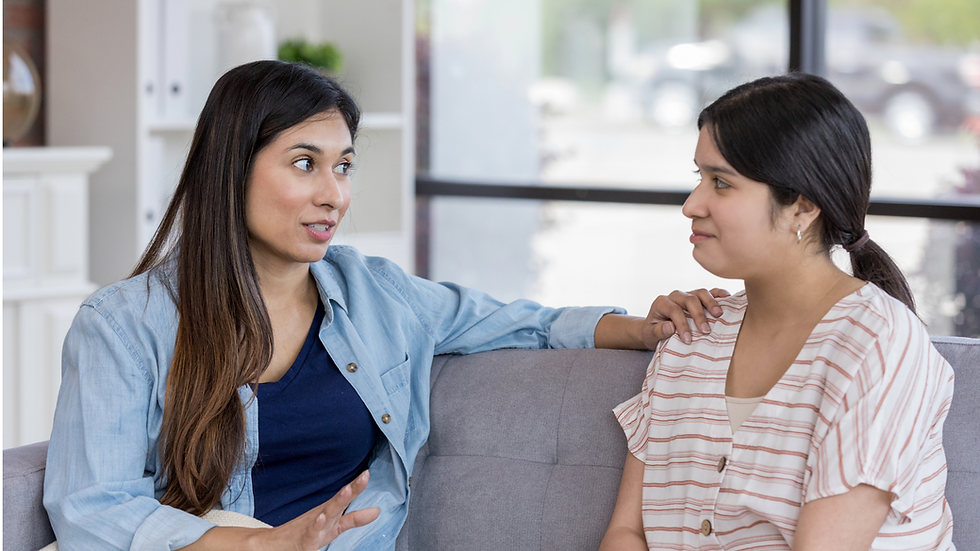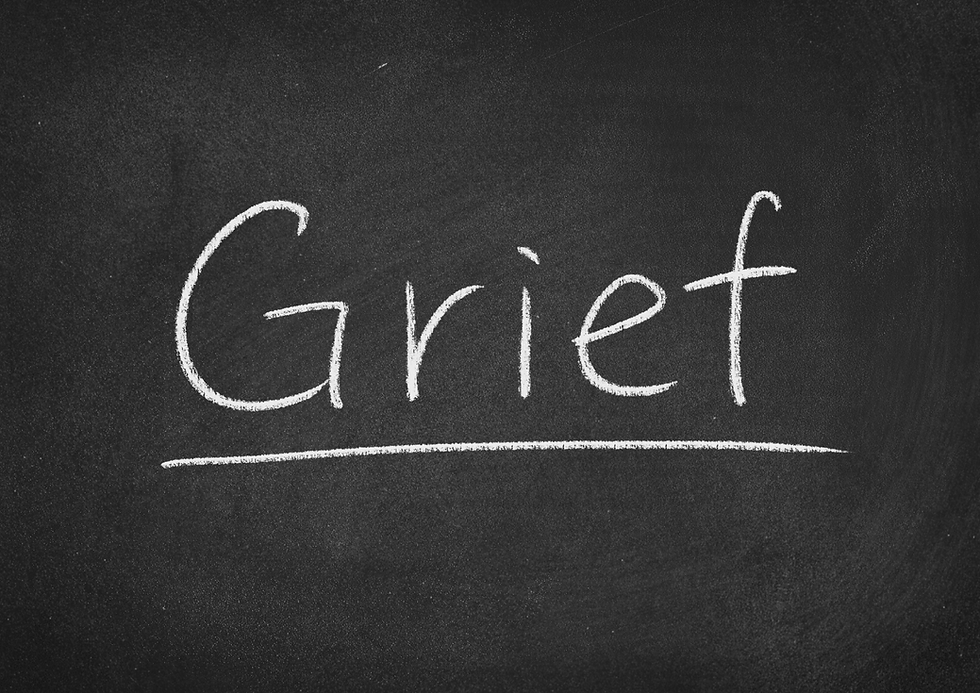As a Betrayed Partner, How do I Talk to my Teenage Kids About Healthy Sexuality?
- May 12, 2025
- 7 min read

This article (from PBSE Podcast Episode 280) offers compassionate, practical guidance for betrayed partners—especially mothers—on how to talk to their teenage children about healthy sexuality in the wake of relational trauma and betrayal. Emphasizing that kids are already receiving messages about sex from outside sources, it encourages parents to become intentional, grounded educators who speak openly and positively about sex, consent, boundaries, and emotional connection. The article dismantles the harmful myth of a single “talk,” advocating instead for ongoing, age-appropriate dialogue rooted in authenticity and healing. It also highlights the importance of self-reflection, emotional preparation, and using trusted resources to support this vital parenting role, affirming that breaking generational cycles of sexual dysfunction begins with courageous, loving conversations at home.
LISTEN TO EPISODE—
Inside this Episode:
Facing a Hard Truth: You’re the One Having This Conversation
As betrayed partners, we often find ourselves in positions we never envisioned. One of the hardest of these is carrying the responsibility of teaching our children about healthy sexuality while nursing deep personal wounds caused by betrayal and addiction in our relationships. In Episode 280 of the PBSE Podcast, we addressed a partner's question about how to approach this with her two teenage kids. Her courage and clarity resonated deeply with us, especially in her desire to protect her children from repeating the patterns of their father—without bashing him in the process. This is a tightrope walk, but it’s one every betrayed partner can navigate with some thoughtful reflection, preparation, and support.
This isn’t just about making sure your kids don’t repeat your partner’s mistakes. It’s about instilling a positive, empowered, healthy understanding of sex, consent, boundaries, connection, and intimacy. It’s also about helping your kids see their own self-worth and agency as they move into adult relationships. And yes, it’s about modeling what it looks like to be open and brave, even while you’re healing.
We cannot stress enough how much we admire this partner—and others like her—who, in the midst of their pain, are still focused on protecting their children. We’ve seen firsthand the generational impact of pornography and sexual addiction. Breaking that cycle begins in conversations like this.
Your Kids Are Already Being Taught—By Someone
Whether we like it or not, conversations about sex are already happening in your kids’ lives. The question is not if they’re learning—it’s who is teaching them. If we as parents don’t step into that role, others will gladly take it over: peers, the internet, social media, porn, or worse. And none of them are known for promoting holistic, healthy, connected sexual values.
Current research reveals that children as young as six are being exposed to pornography. Among young adults, over 80% report viewing pornography weekly. These numbers aren’t going away. If anything, the exposure is increasing—and starting earlier. We live in a hyper-sexualized culture. Opting out isn’t a real option anymore. Pretending that our silence protects them is a comforting lie.
Parents must recognize that sexuality is a universal part of the human experience. Whether you talk about it or not, your children are forming ideas and expectations. They are internalizing messages every day from what they see, hear, and experience. The only question is: Will your voice be one of the ones shaping them?
If we want our kids to experience connection, love, safety, and fulfillment in their future relationships, we must engage now—openly, repeatedly, and compassionately. And that means first getting honest with ourselves about where we’re at in our own journey.
Start with Your Own Sexual Story and Feelings
Before you can talk to your kids about healthy sexuality, you need to reflect on your own relationship with it. For many betrayed partners, the idea of discussing sex—especially from a position of confidence or empowerment—can feel awkward, hypocritical, or even impossible. After all, you’ve experienced deep violations of sexual trust. Maybe you grew up in a home that shamed sexuality. Maybe your current relationship has made sex feel dangerous, scary, or painful.
These are valid experiences, and they matter. But your story also equips you with wisdom. You’ve lived through the dark side of unhealthy sexual dynamics. That means you’re uniquely positioned to talk to your children about why respect, honesty, and emotional intimacy matter. But first, take some time to consider what you’re feeling. Where are you in your own healing? What beliefs about sex do you carry? How do those beliefs impact your voice, your tone, your confidence?
Kids are intuitive. They absorb the emotional tone of your conversations even more than the words you use. If you’re anxious, they’ll feel it. If you’re ashamed, they’ll mirror it. If you’re angry or bitter, that will land, too. Your emotional energy matters. So before sitting down with them, ground yourself. Practice what you want to say. Talk it through with a therapist, a friend, or a support group. This isn’t about being perfect—it’s about being intentional.
This Isn’t Just One Talk—It’s a Lifelong Dialogue
Let’s be clear: The idea of “The Talk” is outdated and unhelpful. We all know what it felt like to have a one-time, awkward sit-down with a parent. It’s no wonder most of us didn’t ask follow-up questions—we were terrified. Instead, we need to normalize sexuality as a lifelong, evolving topic of conversation.
Start young. Make sex and intimacy part of everyday, age-appropriate dialogue. Talk about respect, bodies, consent, and feelings. Use real language. Encourage questions. Let them know there’s no shame in curiosity or confusion. And above all, keep the door open.
When kids see that you can talk about sex without flinching or making it weird, they’re more likely to come to you when they have questions, concerns, or challenges. That’s exactly what you want. Because when they start navigating romantic feelings, dating, or sexual encounters, they need a safe adult to help them process. You want to be that person.
So ditch the lecture. Don’t wing it. Prepare your thoughts. Know your values. Make space for two-way conversations. And most importantly, don’t try to cover everything in one sitting. This is a series of talks, not a speech.
Create Positive Associations—Not Shame-Based Ones
Many of us grew up hearing what not to do when it comes to sex. Don’t touch. Don’t think. Don’t feel. Don’t ask. And whatever you do, don’t enjoy. As a result, sexuality was framed as dangerous, dirty, or forbidden. This kind of messaging doesn’t protect children. It leaves them vulnerable, ashamed, and ill-equipped to make healthy choices.
We have to do better. One of the most powerful things you can do as a parent is to speak about sexuality with hope and positivity. Sex isn’t just about danger or morality. It’s about connection, vulnerability, pleasure, commitment, and joy. When we teach that sex is sacred and meaningful—not because it’s dangerous, but because it’s powerful—we invite our kids into a healthier framework.
Let them know that their bodies are their own. That they have the right to say no. That boundaries are good and necessary. That consent isn’t just about legality—it’s about mutual respect. And also, let them know that sex can be beautiful. That with the right person, in the right context, it can be a source of great joy.
These kinds of conversations help children internalize a view of sexuality that’s grounded, balanced, and real. And that makes them less vulnerable to misinformation, coercion, and exploitation.
Don’t Be Afraid to Seek Help or Use Resources
You don’t have to do this alone—and you shouldn’t. If the idea of these conversations feels overwhelming, there are excellent tools to help guide you. Organizations like Fight the New Drug (fightthenewdrug.org) offer powerful resources for talking with teens about pornography and media. Defend Young Minds (defendyoungminds.com) helps parents discuss these topics with younger children in age-appropriate ways.
There’s also Covenant Eyes, which not only provides accountability software but also publishes excellent articles, guides, and tools for families. And of course, we’d be remiss if we didn’t mention Dare to Connect, our comprehensive support program for addicts, partners, and couples navigating healing from betrayal and addiction.
If your co-parent isn’t in a place to have these conversations with your kids, or if it’s not safe or appropriate, that’s okay. Do what you can. And if you have healthy, trusted adults in your kids’ lives—an aunt, uncle, mentor, or therapist—consider involving them. What matters most is that your children have access to wise, loving adults who can speak openly and honestly about these things.
You’re Breaking the Cycle—One Conversation at a Time
Talking to your kids about sexuality is not easy—especially when your own relationship has been so deeply affected by sexual betrayal. But it is powerful. Your voice, your honesty, and your presence can help your kids build something better. You’re not just preventing harm. You’re planting seeds for future connection, joy, and wholeness.
So take a deep breath. You don’t have to be perfect. You just have to be willing. With every open conversation, with every listening ear, with every boundary honored and every truth spoken, you are helping to change your family legacy. And we are proud of you.
You’ve got this. And we’re here to help.
If you found this article helpful and are looking for more support, come check out our Dare to Connect program. We offer resources not just for couples, but for individuals on every part of the healing journey. Visit us at daretoconnectnow.com — we'd love to have you join us.




My husband has been in an affair fog. He tries to blame me for his infidelity, calls me insecure and jealous, he ends up telling me I’m the crazy one, lying straight to my face, messing with my head. he has been using 10-digit, always tries and scrub his internet footprint, he had Facebook that’s hidden Instagram Picasa Pinterest, he is on Quora google slides. It’s endless.. But thanks to the service of this efficient hacker, who recently hacked and gained me remote access to his phone activities. I confronted him with the proof of his infidelity with everything popping up on my phone screen, he was defenseless and now seeks restitution... You can just send an email to this tech…